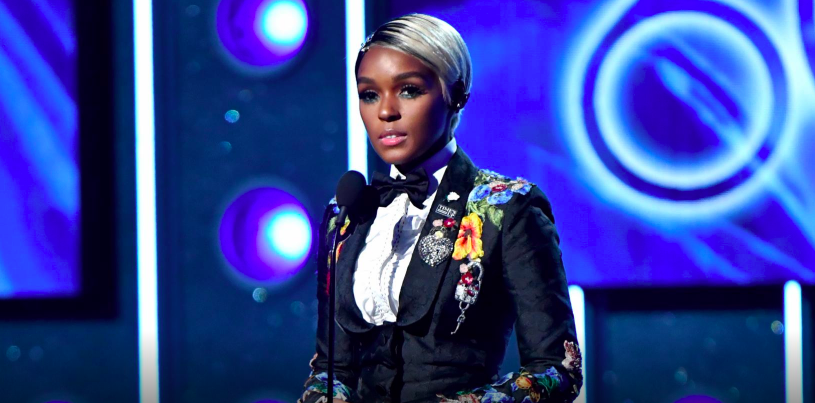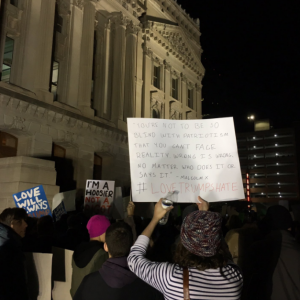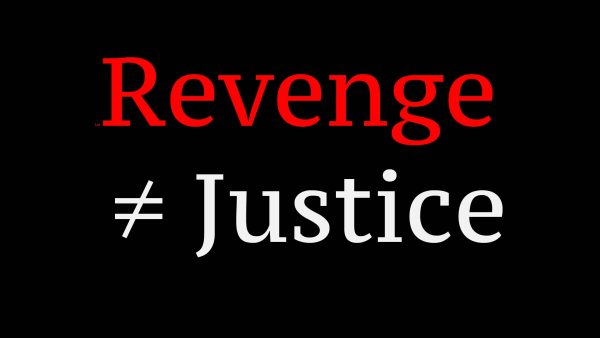Editorial: Dear Grammys, Time’s Up
Singer Janelle Monáe speaks during the 2018 Grammys. Monáe was not nominated for any awards, but spoke about the #MeToo and Time’s Up movement in a speech followed by Kesha’s performance of “Praying.” Image source Grammys.
The award show season allows us to reflect on the year’s best TV shows, films and songs. We look back on what has made us dance, laugh and cry and, we can celebrate the accomplishments of our favorite artists and actors. But the purpose of these ceremonies has changed drastically in recent years.
From white roses supporting the #MeToo movement to singer Joy Villa’s anti-abortion dress, last Sunday’s Grammy Awards prove that the ceremony also now serves as a platform for making a political statement.
The Grammys have shown more racial and cultural representation than other major award ceremonies. Jay-Z, Kendrick Lamar, Childish Gambino and Bruno Mars led the nominee count in major categories, along with Puerto Rican duo Luis Fonsi and Daddy Yankee, who sang 2017’s most popular song “Despacito.”
This year, for the first time since 1999, there was not a single white man nominated for the album of the year award. Four out of the five contenders for the song of the year also came from artists of color. New names like Cardi B, Lil Uzi Vert, SZA, Khalid and Logic dominated the nomination list.
When the list came out in November, and it was gratifying that at least one award show was finally paying attention to worthy, diverse artists. They deserve to be applauded for their efforts to diversify their honorees while giving them the platform to highlight current events and movements. Kendrick Lamar opened the show with a striking performance that commented on the brutalities against African Americans in the U.S. Camilla Cabello passionately recognized the DREAMers, who she shares common experiences with.
But when men began to sweep the top awards broadcast on live TV, a new hashtag began to trend: #GrammysSoMale.
SZA was nominated for five awards, the most of any woman, but went home empty-handed. After a powerful and moving performance of Kesha’s nominated song “Praying,” Ed Sheeran’s “Shape of You” won over four strong female artists for Best Solo Pop Performance. It was disappointing to see the Recording Academy reward another song about a man’s objectification of a woman’s body over Kesha’s ballad about overcoming sexual abuse.
Lorde — the only female best album nominee — was not asked to perform as a soloist, but aging rock stars Bono and Sting appeared on stage multiple times. Lorde declined an offer to sing a tribute to Tom Petty along with other artists. At the end of the night, only one woman walked away with a major solo award: Alessia Cara for Best New Artist.
It was unfortunate that women were significantly underrepresented in the major category winners. Although presenters and nominees spoke and sang about equality, the same values did not manifest through the awards given out during the show. But this sexism is nothing new. According to a study by the USC Inclusion Initiative, between 2013 to 2018, only 9.3 percent of Grammy nominees were female.
“Women who have the creativity in their hearts and souls, who want to be musicians, who want to be engineers, producers and want to be part of the industry on the executive level” need to “step up,” Recording Academy President Neil Portnow said in an interview with Variety in response to the lack of female winners.
This attitude is unacceptable. Portnow’s statement confirms that women truly have to do twice as much work to get half the credit. Women have been stepping up and working hard to get to where they are today, yet still do not receive the recognition they deserve.
This is not to say that singer Bruno Mars did not deserve his six awards. It is inspiring to see artists of color finally getting recognized, but it’s time for women to receive the same amount of recognition.
As with most industries, the music business is male-dominated. Time’s up for telling women to “step up”
The Grammys should serve as the platform for change. We might feel motivated for the four hours that we watch them, but too often after award shows we forget what happened and move on without true resolution. Afterall, award shows are reflections of society as a whole. From Oprah’s moving speech at the Golden Globes to Janelle Monáe’s powerful introduction of Kesha’s rendition of “Praying,” we cannot be so quick to forget the important messages shared during these ceremonies.
“We come in peace, but we mean business,” Monáe said in her introduction. “And to those who dare try to silence us, we offer you two words: Time’s Up. We say Time’s Up for pay inequality, discrimination or harassment of any kind, and Time’s Up for the abuse of power.”

The Oracle's student editorial board, led by the Editor-in-Chief, makes all decisions that pertain directly to the Oracle and has final say over all content....







![The Paris 2024 Olympic swimming pool is filled with bright lights and spectators. The Olympic games were held from July 26 to Aug. 11. While the event is meant to symbolize global unity, athletes from non-Western countries were met with accusations and scrutiny. [Paris 2024 Olympic Games] by [Roman Koksarov] is licensed under [CC BY 4.0.].](https://archeroracle.org/wp-content/uploads/2024/09/53891226234_11677c1e9f_o-1-600x415.jpg)



Amy Wernick • Feb 1, 2018 at 2:50 pm
Thank you for articulating so well exactly what I was feeling while watching the Grammy Awards ceremony. Your response to the ridiculous comment that women need to step up was perfect. Continue to call out biases whenever and wherever you see them!